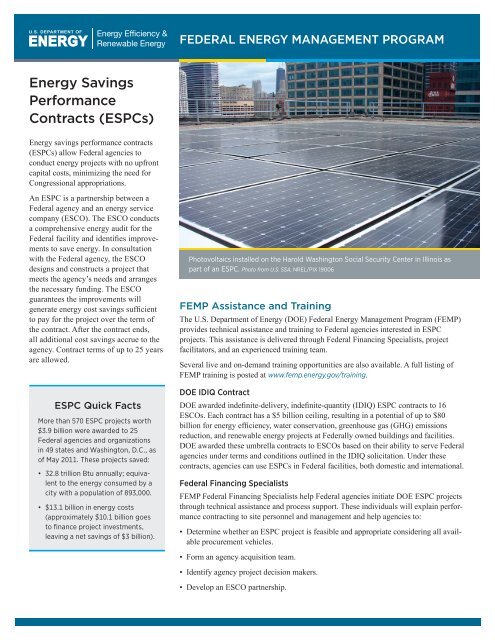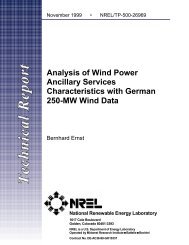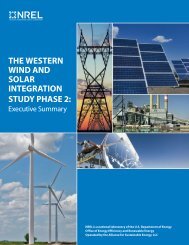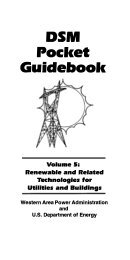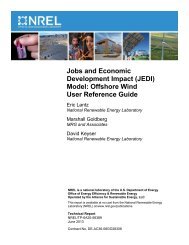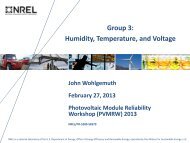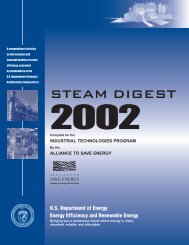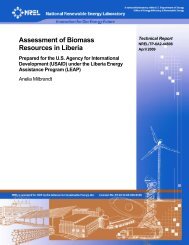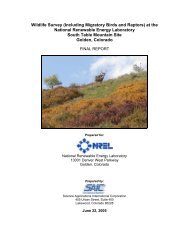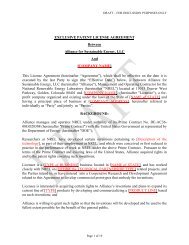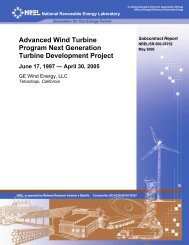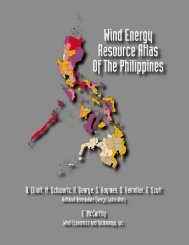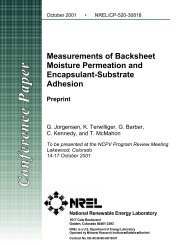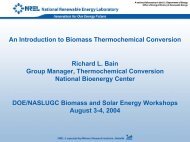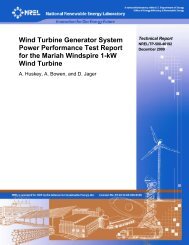Energy Savings Performance Contracts (ESPCs) (Fact Sheet - NREL
Energy Savings Performance Contracts (ESPCs) (Fact Sheet - NREL
Energy Savings Performance Contracts (ESPCs) (Fact Sheet - NREL
Create successful ePaper yourself
Turn your PDF publications into a flip-book with our unique Google optimized e-Paper software.
<strong>Energy</strong> <strong>Savings</strong><br />
<strong>Performance</strong><br />
<strong>Contracts</strong> (<strong>ESPCs</strong>)<br />
<strong>Energy</strong> savings performance contracts<br />
(<strong>ESPCs</strong>) allow Federal agencies to<br />
conduct energy projects with no upfront<br />
capital costs, minimizing the need for<br />
Congressional appropriations.<br />
An ESPC is a partnership between a<br />
Federal agency and an energy service<br />
company (ESCO). The ESCO conducts<br />
a comprehensive energy audit for the<br />
Federal facility and identifies improvements<br />
to save energy. In consultation<br />
with the Federal agency, the ESCO<br />
designs and constructs a project that<br />
meets the agency’s needs and arranges<br />
the necessary funding. The ESCO<br />
guarantees the improvements will<br />
generate energy cost savings sufficient<br />
to pay for the project over the term of<br />
the contract. After the contract ends,<br />
all additional cost savings accrue to the<br />
agency. Contract terms of up to 25 years<br />
are allowed.<br />
ESPC Quick <strong>Fact</strong>s<br />
More than 570 ESPC projects worth<br />
$3.9 billion were awarded to 25<br />
Federal agencies and organizations<br />
in 49 states and Washington, D.C., as<br />
of May 2011. These projects saved:<br />
• 32.8 trillion Btu annually; equivalent<br />
to the energy consumed by a<br />
city with a population of 893,000.<br />
• $13.1 billion in energy costs<br />
(approximately $10.1 billion goes<br />
to finance project investments,<br />
leaving a net savings of $3 billion).<br />
FEDERAL ENERGY MANAGEMENT PROGRAM<br />
Photovoltaics installed on the Harold Washington Social Security Center in Illinois as<br />
part of an ESPC. Photo from U.S. SSA, <strong>NREL</strong>/PIX 19006<br />
FEMP Assistance and Training<br />
The U.S. Department of <strong>Energy</strong> (DOE) Federal <strong>Energy</strong> Management Program (FEMP)<br />
provides technical assistance and training to Federal agencies interested in ESPC<br />
projects. This assistance is delivered through Federal Financing Specialists, project<br />
facilitators, and an experienced training team.<br />
Several live and on-demand training opportunities are also available. A full listing of<br />
FEMP training is posted at www.femp.energy.gov/training.<br />
DOE IDIQ Contract<br />
DOE awarded indefinite-delivery, indefinite-quantity (IDIQ) ESPC contracts to 16<br />
ESCOs. Each contract has a $5 billion ceiling, resulting in a potential of up to $80<br />
billion for energy efficiency, water conservation, greenhouse gas (GHG) emissions<br />
reduction, and renewable energy projects at Federally owned buildings and facilities.<br />
DOE awarded these umbrella contracts to ESCOs based on their ability to serve Federal<br />
agencies under terms and conditions outlined in the IDIQ solicitation. Under these<br />
contracts, agencies can use <strong>ESPCs</strong> in Federal facilities, both domestic and international.<br />
Federal Financing Specialists<br />
FEMP Federal Financing Specialists help Federal agencies initiate DOE ESPC projects<br />
through technical assistance and process support. These individuals will explain performance<br />
contracting to site personnel and management and help agencies to:<br />
• Determine whether an ESPC project is feasible and appropriate considering all available<br />
procurement vehicles.<br />
• Form an agency acquisition team.<br />
• Identify agency project decision makers.<br />
• Develop an ESCO partnership.
FEDERAL ENERGY MANAGEMENT PROGRAM<br />
Marine Corps Logistics Base Albany and a<br />
DOE ESCO review plans to install a 1.9 MW<br />
methane power generator as part of an ESPC<br />
project. Photo from U.S. Marine Corps.<br />
Resources<br />
Additional information is available at:<br />
FEMP ESPC Website<br />
www.femp.energy.gov/financing/<br />
espcs.html<br />
Federal Financing Specialist Contacts<br />
www.femp.energy.gov//financing/<br />
espcs_financingspecialists.html<br />
DOE and Qualified ESCOs<br />
www.femp.energy.gov/financing/<br />
espcs_companies.html<br />
Contacts<br />
For further information and assistance,<br />
contact:<br />
William Raup<br />
Federal <strong>Energy</strong> Management Program<br />
202-586-2214<br />
william.raup@ee.doe.gov<br />
Federal Financing Specialists are organized by geographic service areas. Contact information<br />
is available at www.femp.energy.gov/financing/espcs_financingspecialists.html.<br />
Project Facilitators<br />
Project facilitators guide the acquisition team through the development, awarding, and verification<br />
of savings from ESPC projects, helping Federal agencies avoid obstacles and expedite<br />
projects. A project facilitator serves as an experienced, unbiased advisor responsible for:<br />
• Consulting on contractual and funding issues, technology and engineering issues, and<br />
measurement and verification (M&V) processes.<br />
• Reviewing cost and technical proposals.<br />
• Drafting the agency’s task order request for proposal (RFP).<br />
• Providing other services as requested.<br />
Federal agencies developing DOE ESPC projects receive project facilitator assistance<br />
from FEMP. FEMP covers the cost of this individual through the agency review of the<br />
ESCO preliminary assessment. After that point, services are provided on a reimbursable<br />
basis executed through an interagency agreement with the DOE Golden Field Office.<br />
DOE ESPC Benefits<br />
DOE <strong>ESPCs</strong> help Federal agencies meet energy efficiency, renewable energy, water conservation,<br />
and emissions reduction goals by streamlining private-sector contract funding for<br />
energy management projects. The streamlined process provides multiple benefits, including:<br />
• Increased quality and value through:<br />
– Access to private-sector expertise in energy efficiency, renewable energy, water<br />
conservation, and reduced GHG emissions.<br />
– Built-in incentives for ESCOs to provide high-quality equipment, timely services,<br />
and thorough project commissioning.<br />
– Infrastructure improvements to enhance mission support.<br />
– Healthier, safer working and living environments.<br />
• Flexible, practical contract and procurement processes to ensure the project is completed<br />
as required.<br />
• Expert, objective technical support through FEMP assistance, including:<br />
– FEMP-provided legal and funding guidance, project facilitators, experts on emerging<br />
and underutilized technologies, and training for Federal agencies.<br />
• Smart project management that:<br />
– Ensures building efficiency improvements and new equipment without upfront<br />
capital costs.<br />
– Funds energy improvements without relying on special Congressional<br />
appropriations.<br />
– Guarantees energy and related operation and maintenance cost savings.<br />
– Enhances the ability to plan and budget energy, operation, and maintenance accounts.<br />
– Minimizes vulnerability to budget impacts due to volatile energy prices, weather,<br />
and equipment failure.<br />
Contact a Federal Financing Specialist to get started.<br />
For additional information<br />
please contact:<br />
EERE Information Center<br />
1-877-EERE-INFO (1-877-337-3463)<br />
www.eere.energy.gov/informationcenter<br />
Printed with a renewable-source ink on paper<br />
containing at least 50% wastepaper, including<br />
10% post consumer waste.<br />
FEMP facilitates the Federal Government’s<br />
implementation of sound,<br />
cost-effective energy management<br />
and investment practices to enhance<br />
the nation’s energy security and<br />
environmental stewardship.<br />
DOE/GO-102011-3308 • July 2011


